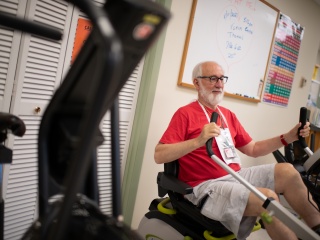Heart Murmur
Heart Murmur Care at UVM Health
A heart murmur is a whooshing or swishing sound made when blood flows harder or faster than normal through the heart or blood vessels.
Heart murmurs are a very common condition, particularly in children. Most heart murmurs do not require treatment and will go away on their own. These harmless heart murmurs are known as “innocent” heart murmurs. However, in some cases a heart murmur can be a sign of a more serious heart condition, such as congenital heart disease or heart valve disease.

Why Choose UVM Health?
At University of Vermont Health, we take a coordinated, team-based approach to caring for patients of all ages with heart murmurs across Vermont and northern New York.
As one of the leading heart and vascular programs in the region, we offer:
- Specialized experts: Heart murmurs require monitoring and treatment by a team of specialists. Our general cardiologists, interventional cardiologists, cardiac surgeons and imaging specialists collaborate to determine what treatment is right for you and make sure you get the very best care.
- Advanced treatment options: Our cardiologists offer long-term monitoring, management and treatment of heart murmurs. For those with abnormal heart murmurs that require treatment beyond medication, our structural cardiology team offers catheter-based treatments as an alternative to open-heart surgery.
What Causes Heart Murmurs?
Innocent heart murmurs are caused by abnormal blood flow through the heart. This is often a harmless condition, brought on by:
- Growth spurts
- Pregnancy
- Exercise
- Anemia
- Hyperthyroidism
Abnormal heart murmurs are caused by more serious cardiac conditions and can either be congenital (appearing at birth) or acquired (developing later in life). Congenital heart murmurs are often a sign of a congenital heart defect, such as atrial septal defect (ASD), or other structural heart problems.
Acquired heart murmurs are typically caused by damaged heart valves. A number of conditions can cause heart valve damage, including:
- Endocarditis: An infection of the heart
- Rheumatoid heart disease: A complication of strep throat
- Calcium deposits: Can stiffen and narrow the heart valves (stenosis)
Types of Heart Murmur
There are three types of heart murmur. Each type is defined by when it appears in the heartbeat.
- Systolic heart murmur: Occur during a heart muscle contraction, when the heart is emptying of blood.
- Diastolic heart murmur: Occur when the heart muscle relaxes, as the heart is filling with blood.
- Continuous heart murmurs: Occur throughout the heartbeat, during both the contraction and relaxation of the heart muscle.
Symptoms of Heart Murmur
Innocent heart murmurs are typically harmless, and do not cause symptoms. Abnormal heart murmurs may have a range of symptoms depending on the underlying condition causing the murmur. These may include:
- A fast or irregular heartbeat (arrhythmia)
- Blue-tinted skin, lips and fingernails (cyanosis)
- Fatigue
- Shortness of breath
- Swelling of body tissue or organs (edema)
- Chest pain
- Dizziness and fainting
- Poor growth (in infants and children)
Diagnosing Heart Murmur
Most heart murmurs are found during regular doctor’s visits. During a physical exam, your provider will listen to each part of the heartbeat and identify any extra sounds, or murmurs, that may be present. They can often tell whether a murmur is innocent based on how loud it is, what part of the heart it comes from and what kind of sound it is.
Your doctor will also look for signs of an underlying heart condition. If they think your murmur may be a sign of a more serious problem, they will order further testing to check your heart structure and function.
Heart murmur diagnosis and testing may include:
- Echocardiogram: Creates a video image of your heart pumping blood and determine how well it is working
- Electrocardiogram (EKG): Records your heart’s electrical activity and identify any abnormal rhythms and stress to the heart
- Chest X-ray: Fully examines your heart and blood vessels
- Cardiac catheterization (angiogram): Identifies heart defects using a long, thin tube (catheter), a special dye and imaging tools
Heart Murmur Treatment
If you have an innocent heart murmur, you do not need treatment because your heart is normal. An innocent heart murmur will often resolve on its own.
If you have an abnormal murmur, treatment will depend on the underlying condition that is causing the murmur. Treatment often includes medication to address the symptoms of a heart problem or other condition (such as anemia or hyperthyroidism). Surgery or minimally invasive catheter-based procedures are also an option if the heart murmur is caused by a structural heart defect that needs to be repaired.
However, not all abnormal murmurs need to be treated. If you have an abnormal murmur and have no other symptoms, your doctor may recommend ongoing monitoring instead of treatment.
Locations Near You
Share your location to see nearby providers and availability
62 Tilley Drive
Suite 101
South Burlington, VT 05403
118 Tilley Drive
Suite 102
South Burlington, VT 05403-4450
115 Porter Drive
Middlebury, VT 05753
75 Park Street
Elizabethtown, NY 12932
101 Adirondack Drive
Suite 1
Ticonderoga, NY 12883
66 Park Street
Elizabethtown, NY 12932
133 Park Street
Malone, NY 12953
130 Fisher Road
Berlin, VT 05602
210 Cornelia Street
Ste 104
Plattsburgh, NY 12901
62 Tilley Drive
Suite 101
South Burlington, VT 05403-4407


